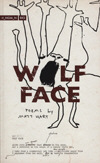Wolf Face
In a poem that couldn’t be more aptly titled, “Poem,” the poet philosophizes: “The problem of meaning can’t begin / until you think it.” Judging from these quirky and oddly appealing poems, I would say that Hart thinks about meaning, meaning he thinks about thinking, a lot. His preoccupations—running, his dog, his marriage, his baby, his students—are excuses (reasons?) to think about meaning.
Here is Hart thinking about false meaning(s): “We lie because we are human” (“New Day Rising”). Here is Hart thinking about the absence of meaning: “This language isn’t anywhere” (“New-Fangled Air”). Here is Hart thinking about the relationship of data to meaning: “I’m thinking it’s not information / the robins and finches” (“Watch Me Blowtorch”). Here’s Hart thinking about story and meaning: “And now / I can only repeat myself, because / there is nothing to narrate” (“Goodnight Everybody”). And here is Hart thinking about faith and meaning: “The reason it’s good to have faith / is the reason for everything good” (“Electron Face”).
If these examples seem to suggest that Hart is a poet of metaphysical impulses, I would say this is not really, or not entirely, the case. He is, despite his obsessive thinking about meaning, grounded in the often disturbing or confusing images and data—astutely rendered— of daily life: “the half-baked smell of church”; “hot air balloon made of unmade beds”; “ancient glowing phone booth”; “plastic deck chairs upside down.”
Hart is anxious and edgy (“Today this tenseness is a past or present anxious”), and despite his desire to have faith and his faith in desire, he is often worried about how life disappoints us (“Have a nice day because most days you won’t”). He turns his anguish into poems that race along urgently and then pause to take in what he has experienced. In “Nosebleed,” of a marital dispute, he writes: “Nothing for miles but grass. I do what is done / to me. It seems important to hurt.”
One of the most ambitious pieces in the collection is “In Darkness Light-headed,” a series of linked poems that unite Hart’s preoccupations and strengths in lucid, anxious, and at times lyrical lines that straddle the extremes played out throughout the book, despair and hope, hurt and joy, love and despising, optimism and pessimism.
Hart is the founder and editor of a marvelously original little journal, Forklift, Ohio: A Journal of Poetry, Cooking & Light Industrial Safety (to which he makes reference in a poem in this collection). This volume, like his journal, is hard to classify, define, or categorize, but not hard to appreciate. It’s just important to remember that it won’t mean much, if you don’t think about it.





